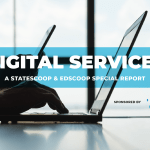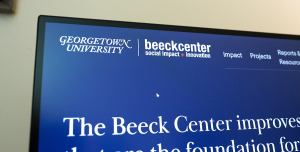How the Beeck Center helps improve digital services

Government agencies across the country are experimenting with new technologies and processes, but much of the work goes unexamined.
To ensure the best ideas aren’t lost, Georgetown University’s Beeck Center for Social Impact and Innovation launched a new program last year that places its fellows within state and local government agencies. In those positions, the fellows assist projects intended to improve how residents interact with their governments, and they observe and document the work of digital services teams, capturing the best work so that it can be shared and potentially implemented more widely.
Beeck Center fellows are currently working in New Jersey, Colorado and New York City.
The program is led by Kevin Parker, who’s worked for at least seven state and local governments, including a recent year as North Dakota’s chief reinvention officer, which followed stints in Illinois; Rhode Island; Boston; Las Vegas; Mobile, Alabama; and Peoria, Illinois.
 “At the Beeck Center, we use the tools of design, data and technology to make systems work better for everybody and our fellows lead initiatives to surface best practices, to document what works and to coordinate partners, to share lessons at scale,” Parker said in an interview.
“At the Beeck Center, we use the tools of design, data and technology to make systems work better for everybody and our fellows lead initiatives to surface best practices, to document what works and to coordinate partners, to share lessons at scale,” Parker said in an interview.
Parker reviewed some of the recent digital services work in government that was documented by the Beeck Center through its new program and shared what he thinks other state and local agencies can learn from it.
You’re in charge of the Beeck Center’s initiative placing fellows in state agencies — how has that work been going?
I can’t express enough how many great things are happening here. Over time, we’ve recognized that more and more governments are investing in dedicated service delivery units modeled after the teams that have existed for years in places like Georgia, Massachusetts, San Francisco and across the federal government.
Our researchers say they get calls all the time from other states and cities asking for a playbook on how to do this. So we’re also compiling lessons and best practices as a sort of starter kit for governments that are also interested in considering a dedicated digital service team and don’t know where to really start.
What are your researchers learning?
Over the past year, our researchers have uncovered a lot of important lessons learned. Most of what we observe, we’re able to shape into case studies and publish so others can borrow these lessons and apply them in their own governments, kind of like a true community of practice.
We had a researcher, Sarah Rodriguez, join the New York City Mayor’s Office of the Chief Technology Officer last fall for the NYC[x] Innovation Fellows program. For older New Yorkers, the risk of being isolated in quarantine, virtual programming delivered by senior service providers offers a key lifeline and source of social interaction with peers. The department of the aging, and MOCTO and these fellows designed and built solutions that would be both easy for older adults to use and minimize the operational impact for senior center providers. What’s remarkable is that in these ten week sprints they’ve been able to glean insights about this particular group, elderly folks in New York City, and design around their needs.
Kelly Taylor, director of the Colorado Digital Service, was a guest on our most recent Priorities podcast, in which he talked about agile budgeting, user experience and procurement. What has your fellow learned in Colorado?
There’s a partnership between the Colorado Digital Service team that’s aligned with the Governor’s Office of Information Technology and the Colorado Department of Public Health and the Environment, that included 53 local public health agencies to really rethink how it went about procuring technology in response to COVID-19. Reilly Martin is the current fellow, who replaced Yeri Kim, last year’s fellow.
The theory of change that the Colorado team was thinking of was how by using an interactive human-centered demo-based approach, they would be able to evaluate vendors in a real-world environment on the criteria that mattered the most and would be more likely to select the solution that best met Colorado user needs. And they went on to think about how to involve front-line public health workers in the selection process of their case investigation and contact-tracing solution, to generate that buy-in and increase the uptake of the selected software solution.
I think what we’re seeing in governments across the nation, especially with federal relief funding, that procuring differently will be really important. And I think what they found was that the show-don’t-tell framework was a really powerful evaluation strategy: to work in the open, to show trust with stakeholders, especially users at the local public health agencies
And what’s going on in New Jersey?
In New Jersey we have Katherine Austin-Evelyn, and last year the fellow was Conor Carroll, embedded with the New Jersey Office of Innovation.
The State of New Jersey recognized both the need to receive data on the spread of the disease and provide information to the public on how to mitigate it, as well. So to create this two-way flow of information during a crisis, the state quickly spun up their COVID19.nj.gov site. Here our lessons were to design content for digital consumption. Yes, government websites are extremely critical, but they’re not always optimized for digital or mobile channels. And they’re not always written in plain language.
And iteration is key to building human-centered tools. It’s rarely going to be this beautiful thing coming out at first, but you can continue to iterate, capture analytics, incorporate insights and deepen your understanding of what user needs are so you can build that into the tool or solution.
This interview was edited and condensed.
Read more of StateScoop and EdScoop’s 2021 special report on digital services.

This story was featured in StateScoop Special Report: Digital Services (2021)






